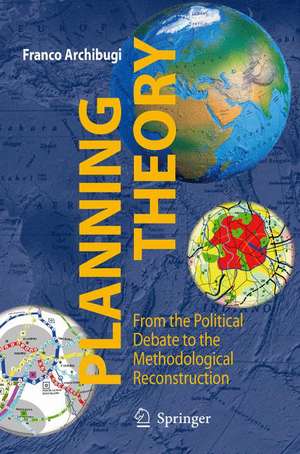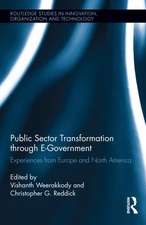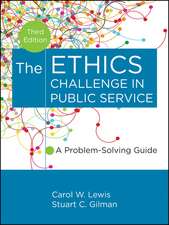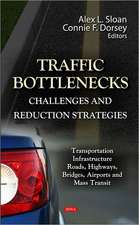Planning Theory: From the Political Debate to the Methodological Reconstruction
Autor Franco Archibugien Limba Engleză Hardback – 27 noi 2007
Instead of seriously revising the technical and scientific shortcomings marking the various problems encountered in the planning experience in both fields, academic debates and reflection have instead led to a kind of political interpretation. On the basis of the hopelessness of improving the governance of managerial and political planning initiatives, planning theory has been reduced to a generic sociological debate on planning itself; a debate that freezes planning as a permanently declining engagement.
To oppose this, the present book aims to identify the essential guidelines of a re-launch of planning processes and techniques, configuring a kind of neo-discipline, called ‘planology’ by the author, which builds upon a multi-disciplinary integration (never seen and experimented with until now) of economic, environmental, and sociological approaches, a crucial element missing in previous unsuccessful planning attempts.
| Toate formatele și edițiile | Preț | Express |
|---|---|---|
| Paperback (1) | 379.09 lei 6-8 săpt. | |
| Springer – 21 oct 2010 | 379.09 lei 6-8 săpt. | |
| Hardback (1) | 386.81 lei 6-8 săpt. | |
| Springer – 27 noi 2007 | 386.81 lei 6-8 săpt. |
Preț: 386.81 lei
Nou
Puncte Express: 580
Preț estimativ în valută:
74.02€ • 76.48$ • 61.57£
74.02€ • 76.48$ • 61.57£
Carte tipărită la comandă
Livrare economică 19 martie-02 aprilie
Preluare comenzi: 021 569.72.76
Specificații
ISBN-13: 9788847006959
ISBN-10: 8847006953
Pagini: 140
Ilustrații: XII, 126 p.
Dimensiuni: 155 x 235 x 13 mm
Greutate: 0.39 kg
Ediția:2008
Editura: Springer
Colecția Springer
Locul publicării:Milano, Italy
ISBN-10: 8847006953
Pagini: 140
Ilustrații: XII, 126 p.
Dimensiuni: 155 x 235 x 13 mm
Greutate: 0.39 kg
Ediția:2008
Editura: Springer
Colecția Springer
Locul publicării:Milano, Italy
Public țintă
Professional/practitionerCuprins
PlanningTheory: Reconstruction or Requiem?.- In Search of Integration:The Past Negative Experience.- Towards a New Unified Discipline of Planning.- The First Routes of the New Discipline.- Some Integrative Topics of the New Planning Discipline.- Planning Science: Basic Postulates and Logical Framework for Reference.- The Future of National Planning Systems: Some New Steps.- Planning and Plan Evaluation: SomeWell-Known and Often Neglected Pitfalls.- Conclusions.
Notă biografică
Professor of Planning (in several Italian Universities, and lastly at the Postgraduate School of Public Administration, Rome; President of the Planning Studies Centre, Rome).
He has been consultant of many international institutions (UNDP, UNESCO, UN-ECE, UNEP, OECD, European Union, Council of Europe and others) and of the Italian Government.
Author of some books in economics and planning, which have had international audience within the scientific community, like The Associative Economy (Macmillan, 2000), The Ecological City (Ashgate, 1997), Economy and Ecology (co-ed., Kluwer, 1992), and others.
He has been consultant of many international institutions (UNDP, UNESCO, UN-ECE, UNEP, OECD, European Union, Council of Europe and others) and of the Italian Government.
Author of some books in economics and planning, which have had international audience within the scientific community, like The Associative Economy (Macmillan, 2000), The Ecological City (Ashgate, 1997), Economy and Ecology (co-ed., Kluwer, 1992), and others.
Textul de pe ultima copertă
"…This book makes two really compelling arguments: Firstly, that planning theory has lost its focus on the planning process itself and how it can be used effectively to help people figure out what they want, how to get it, and why… Secondly, that planning theory also has lost its focus on the institutional interconnections of planning processes from national, to state or regional, to local levels, and back up again. I think the author is quite right on both counts… It strikes me that what is needed now is an integration of macro and micro perspectives, which is a point that the book makes at various stages…"
Prof. John M. Bryson, Hubert H. Humphrey Institute of Public Affairs, University of Minnesota
"In this book Archibugi criticises current planning theory literature and the current planning debate. His idea is that many authors use a notion of planning that is too ample and generic, with the consequence that their theory of planning is itself too ample and generic, and consequently of scant operative use for practitioners. Instead of a theory of planning (and in planning) we therefore have, today, some kind of theory on planning or about planning; a sort of meta-analysis or meta-debate that takes us nowhere. This is, in Archibugi’s view, the main reason of the limited advances we have had in this field and of the loss of identity we - as planners and planning theorists - frequently experience…
To find a remedy for this situation, Archibugi proposes returning to the idea of planning as a method of making rational decision; a method that is, to some extent, common to many areas. In this perspective… planning is essentially oriented toward optimisation. In the ex-ante voluntaristic perspective adopted, planning cannot be anything but an effort to achieve the best possible result, within given constraints, with regard to the objectives undertaken…
In this perspective, forms of participative,collaborative, co-operative planning are not a new mode or kind of planning, but, instead, they are procedures for a viable form of planning intended as a good decision process (not exactly new procedures, and yet still relevant in particular situations).
From this idea of planning we can derive some fundamental consequences for planning theory itself. …Planning theory is not a philosophical, sociological or politological enterprise, but a methodological one. Planning theory can be seen as a theory dealing with the logical and operational frame of any planning procedure intended as a rational method of decision and choice. ...Planning theory is essentially interested in exploring and showing what is useful to correctly decide and act, and not simply how to know the world as it is.
Archibugi’s book is both stimulating and provocative, and also courageous in challenging many new orthodoxies in the planning field (note how criticising the rational approach has become a kind of universal sport)."
Stefano Moroni, Professor of planning, ‘Polytechnic University’ of Milan [from Planning Theory Vol. 4, 2005, Sage Pubblications]
Prof. John M. Bryson, Hubert H. Humphrey Institute of Public Affairs, University of Minnesota
"In this book Archibugi criticises current planning theory literature and the current planning debate. His idea is that many authors use a notion of planning that is too ample and generic, with the consequence that their theory of planning is itself too ample and generic, and consequently of scant operative use for practitioners. Instead of a theory of planning (and in planning) we therefore have, today, some kind of theory on planning or about planning; a sort of meta-analysis or meta-debate that takes us nowhere. This is, in Archibugi’s view, the main reason of the limited advances we have had in this field and of the loss of identity we - as planners and planning theorists - frequently experience…
To find a remedy for this situation, Archibugi proposes returning to the idea of planning as a method of making rational decision; a method that is, to some extent, common to many areas. In this perspective… planning is essentially oriented toward optimisation. In the ex-ante voluntaristic perspective adopted, planning cannot be anything but an effort to achieve the best possible result, within given constraints, with regard to the objectives undertaken…
In this perspective, forms of participative,collaborative, co-operative planning are not a new mode or kind of planning, but, instead, they are procedures for a viable form of planning intended as a good decision process (not exactly new procedures, and yet still relevant in particular situations).
From this idea of planning we can derive some fundamental consequences for planning theory itself. …Planning theory is not a philosophical, sociological or politological enterprise, but a methodological one. Planning theory can be seen as a theory dealing with the logical and operational frame of any planning procedure intended as a rational method of decision and choice. ...Planning theory is essentially interested in exploring and showing what is useful to correctly decide and act, and not simply how to know the world as it is.
Archibugi’s book is both stimulating and provocative, and also courageous in challenging many new orthodoxies in the planning field (note how criticising the rational approach has become a kind of universal sport)."
Stefano Moroni, Professor of planning, ‘Polytechnic University’ of Milan [from Planning Theory Vol. 4, 2005, Sage Pubblications]
Caracteristici
Includes supplementary material: sn.pub/extras














